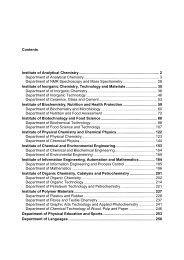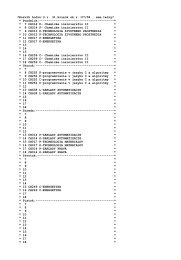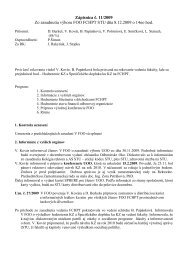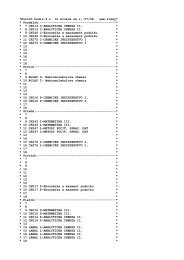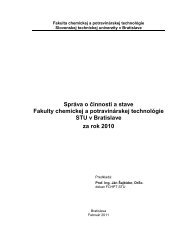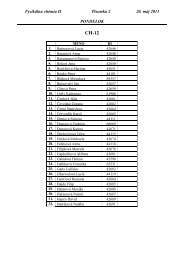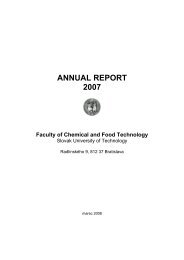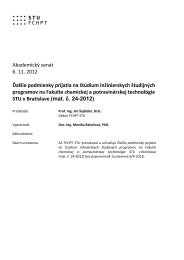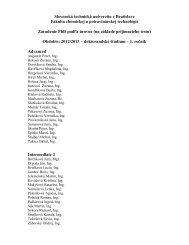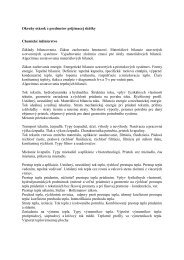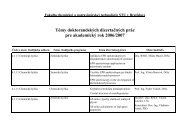rok 2006 - Fakulta chemickej a potravinárskej technológie ...
rok 2006 - Fakulta chemickej a potravinárskej technológie ...
rok 2006 - Fakulta chemickej a potravinárskej technológie ...
You also want an ePaper? Increase the reach of your titles
YUMPU automatically turns print PDFs into web optimized ePapers that Google loves.
stability of food enzymes, the inactivation kinetics of individual enzymes in a broad temperature range and to<br />
carry out the comparative consumer study of food products obtained by conventional and ohmic heating.<br />
Project duration: from 01.03.2004 to 28.02.<strong>2006</strong><br />
H. Project FP6-NMP3-CT-2004-500160, Advanced interactive materials by design (AIMs). (Milan<br />
Polakovič)<br />
This integrated project (AIMs) is targeted at the design of a new class of interactive materials composed of<br />
functional elements (ligands) for use in the selective purification steps (i.e. chromatography, membrane<br />
separation, extraction) of pharmaceutical, chemical and bioindustries. A real breakthrough in the optimization of<br />
production processes in these areas requires the integration of material sciences and process development. AIMs<br />
focuses on the production of monoclonal antibodies as an example process. The main objectives in terms of<br />
radical innovation in monoclonal antibodies production are an increase in capacity by a factor of 10 to 50 and a<br />
reduction of cost of goods by a factor of 10 to 100. The STU teams act in one of six subprojects of this integrated<br />
project dealing with the characterization of structural and process parameters of investigated materials and<br />
processes. The role of STU is to determine accessibility of different chromatographic adsorbents by sizeexclusion<br />
techniques, the static adsorption capacity of proteins of interest as well as their dynamics of binding.<br />
Together with other partners, the correlations between structural and performance parameters are made which<br />
are communicated to the partners involved in the material and process design, respectively.<br />
Project duration: from 01.04.2004 to 31.03.2008<br />
I. Project APVT-99-019604, Experimental study of gamma-decalactone production by<br />
microbial biotransformation (Vladimír Štefuca)<br />
The basic aim of the project is the achievement of knowledge necessary for the development of a process of<br />
preparation of gamma-decalactone (GDL) - a bioaroma with high added value, by biotransformation from a<br />
natural precursor. In order to reach this objective, in the first part of the project, it will be necessary to determine<br />
cultivation and biotransformation conditions for a chosen microorganism. The next key task of GDL preparation<br />
will be isolation from the culture medium connected with lactonisation of the intermediate product and purification<br />
to final purity.<br />
Project duration: from 01.01.2005 to 31.12. 2007<br />
J. Project APVT-20-025704, Process development for biotechnological production of<br />
fructooligosaccharides (Milan Polakovič)<br />
The growing demand for healthy food including non-synthetic additives forms a potential for significant<br />
enlargement of the existing production capaticies of fructooligosaccharides, which belong to important prebiotics.<br />
The ambition of the project is to develop a technological process which could be implemented. The project<br />
elaborates all principal steps of the production process which are: aerobic cultivation of cells Aureobasidium<br />
pullulans, isolation and immobilization of enzyme fructosyltransferase, biocatalytic production of<br />
fructooligosaccharides, and the adsorption separation of fructooligosaccharides.<br />
Project duration: from 01.01.2005 to 31.12. 2007<br />
K. Project No. 11 of the Slovak-Hungarian Bilateral Cooperation in Science, Enhancement of<br />
the stability of lipase enzymes in ionic liquids (Milan Polakovič)<br />
The joint project focuses on the bioprocess engineering aspects connected with the application of enzymatic<br />
reactions in ionic liquids. The improved efficiency of biotransformations is envisaged by investigating the effect of<br />
water activity and thermal stability on the performance of lipase in hydrolytic and esterification reactions using<br />
ionic liquids as solvents. By screening suitable enzyme sources and reaction media, it is expected to obtain chiral<br />
compounds of interest for the synthesis of fine chemicals and pharmaceuticals.<br />
Project duration: from 01.01.2005 to 31.12. <strong>2006</strong><br />
84



